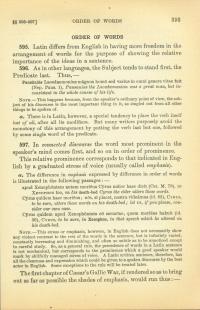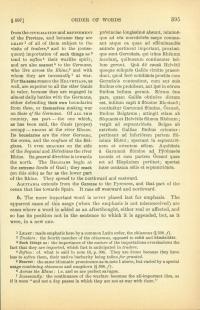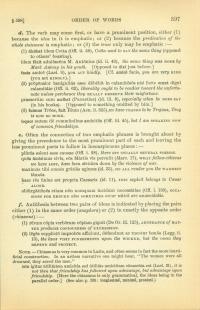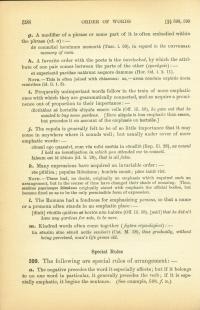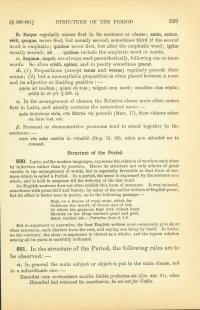595. Latin differs from English in having more freedom in the arrangement of words for the purpose of showing the relative importance of the ideas in a sentence.
596. As in other languages, the Subject tends to stand first, the Predicate last.
Pausāniās Lacedaemonius māgnus homō sed varius in omnī genere vītae fuit. (Nep. Paus. 1) Pausanias the Lacedœmonian was a great man, but inconsistent in the whole course of his life.
Note— This happens because, from the speaker's ordinary point of view, the subject of his discourse is the most important thing in it, as singled out from all other things to be spoken of.
a. There is in Latin, however, a special tendency to place the verb itself last of all, after all its modifiers. But many writers purposely avoid the monotony of this arrangement by putting the verb last but one, followed by some single word of the predicate.
597. In connected discourse the word most prominent in the speaker's mind comes first, and so on in order of prominence. This relative prominence corresponds to that indicated in English by a graduated stress of voice (usually called emphasis).
a. The difference in emphasis expressed by difference in order of words is illustrated in the following passages.
Apud Xenophōntem autem moriēns Cȳrus mâior haec dīcit. (Cat. M. 79) IN XENOPHON too, on his death-bed Cyrus the elder utters these words.
Cȳrus quidem haec moriēns; nōs, sī placet, nostra videāmus. (id. 82) CYRUS, to be sure, utters these words on his death-bed; let US, if you please, consider our own case.
Cȳrus quidem apud Xenophōntem eō sermōne, quem moriēns habuit (id. 30) CYRUS, to be sure, in Xenophon, in that speech which he uttered on his death-bed
Note— This stress or emphasis, however, in English does not necessarily show any violent contrast to the rest of the words in the sentence, but is infinitely varied, constantly increasing and diminishing, and often so subtle as to be unnoticed except in careful study. So, as a general rule, the precedence of words in a Latin sentence is not mechanical, but corresponds to the prominence which a good speaker would mark by skilfully managed stress of voice. A Latin written sentence, therefore, has all the clearness and expression which could be given to a spoken discourse by the best actor in English. Some exceptions to the rule will be treated later.
The first chapter of Cæsar's Gallic War, if rendered so as to bring out as far as possible the shades of emphasis, would read as follows.
|
GAUL,1 in the widest sense, is divided2 into three parts,3 which are inhabited4 (as follows): one5 by the Belgians, another6 by the Aquitani, the third by a people called in their own7 language Celts, in ours Gauls. THESE8 in their language,9 institutions, and laws are all of them10 different. The GAULS11 (proper) are separated12 from the Aquitani by the river Garonne, from the Belgians by the Marne and Seine. Of THESE13 (TRIBES) the bravest of all14 are the Belgians, for the reason that they live farthest15 away from the CIVILIZATION and REFINEMENT of the Province, and because they are LEAST16 of all of them subject to the visits of traders,17 and to the (consequent) importation of such things as18 tend to soften19 their warlike spirit; and are also nearest20 to the Germans, who live across the Rhine,21 and with whom they are incessantly22 at war. For the same reason the HELVETIANS, as well, are superior to all the other Gauls in valor, because they are engaged in almost daily battles with the Germans, either defending their own boundaries from them, or themselves making war on those of the Germans. Of ALL THIS country, one part—the one which, as has been said, the Gauls (proper) occupy—BEGINS at the river Rhone. Its boundaries are the river Garonne, the ocean, and the confines of the Belgians. It even REACHES on the side of the Sequani and Helvetians the river Rhine. Its general direction is towards the north. The BELGIANS begin at the extreme limits of Gaul; they reach (on this side) as far as the lower part of the Rhine. They spread to the northward and eastward. AQUITANIA extends from the Garonne to the Pyrenees, and that part of the ocean that lies towards Spain. It runs off westward and northward. |
Gallia est omnis dīvīsa in partīs trīs, quārum ūnam incolunt Belgae, aliam Aquītānī, tertiam quī ipsōrum linguā Celtae, nostrā Gallī appellantur. Hī omnēs linguā, īnstitūtīs, lēgibus inter sē differunt. Gallōs ab Aquītānīs Garumna flūmen, ā Belgīs Mātrona et Sēquana dīvidit. Hōrum omnium fortissimī sunt Belgae, proptereā quod ā cultū atque hūmānitāte prōvinciae longissimē absunt, minimēque ad eōs mercātōrēs saepe commeant atque ea quae ad effēminandōs animōs pertinent important, proximīque sunt Germānīs, quī trāns Rhēnum incolunt, quibuscum continenter bellum gerunt. Quā dē causā Helvētiī quoque reliquōs Gallōs virtūte praecēdunt, quod ferē cotīdiānīs proeliīs cum Germānīs contendunt, cum aut suīs fīnibus eōs prohibent, aut ipsī in eōrum fīnibus bellum gerunt. Eōrum ūna pars, quam Gallōs obtinēre dictum est, initium capit ā flūmine Rhodanō; continētur Garumnā flūmine, Ōceanō, fīnibus Belgārum; attingit etiam ab Sēquanīs et Helvētiīs flūmen Rhēnum; vergit ad septentriōnēs. Belgae ab extrēmīs Galliae fīnibus oriuntur: pertinent ad īnferiōrem partem flūminis Rhēnī; spectant in septentriōnem et orientem sōlem. Aquītānia ā Garumnā flūmine ad Pȳrēnaeōs montīs et eam partem Ōceanī quae est ad Hispāniam pertinet; spectat inter occāsum sōlis et septentriōnēs |
b. The more important word is never placed last for emphasis. The apparent cases of this usage (when the emphasis is not misconceived) are cases where a word is added as an afterthought, either real or affected, and so has its position not in the sentence to which it is appended, but, as it were, in a new one.
598. The main rules for the Order of Words are as follows.
a. in any phrase the determining and most significant word comes first:
-
Adjective and Noun.
omnīs hominēs decet EVERY man ought (opposed to some who do not)
Lūcius Catilīna nōbilī genere nātus fuit, māgnā vī et animī et corporis, sed ingeniōmalō prāvōque. (Sall. Cat. 5) Lucius Catiline was born of a NOBLE family, with GREAT force of mind and body, but with a NATURE that was evil and depraved. [Here the adjectives in the first part are the emphatic and important words, no antithesis between the nouns being as yet thought of; but in the second branch the noun is meant to be opposed to those before mentioned, and immediately takes the prominent place, as is seen by the natural English emphasis, thus making a chiasmus.23]
-
Word with modifying case.
quid magis Epamīnōndam, Thēbānōrum imperātōrem, quam victōriae Thēbānōrum cōnsulere decuit? (Inv. 1.69) What should Epaminondas, commander of the THEBANS, have aimed at more than the VICTORY of the Thebans?
Lacrimā nihil citius ārēscit. (id. 1.109) Nothing dries quicker than a TEAR.
nēmō ferē laudis cupidus (De Or. 1.14) hardly any one desirous of GLORY (cf. Manil. avidī laudis EAGER for glory).
b. Numeral adjectives, adjectives of quantity, demonstrative, relative, and interrogative pronouns and adverbs, tend to precede the word or words to which they belong.
cum aliquā perturbātiōne (Off. 1.137) with SOME disturbance
hōc ūnō praestāmus (De Or. 1.32) in THIS one thing we excel
cēterae ferē artēs the OTHER arts
Note— This happens because such words are usually emphatic; but often the words connected with them are more so, and in such cases the pronouns etc. yield the emphatic place.
causa aliqua (De Or. 1.250) some CASE
stilus ille tuus (id. 1.257) that well-known STYLE of yours (in an antithesis; see passage) [Ille is idiomatic in this sense and position.]
Rōmam quae apportāta sunt (Verr. 4.121) what were carried to ROME (in contrast to what remained at Syracuse)
c. When sum is used as the Substantive verb (§ 284.b), it regularly stands first, or at any rate before its subject.
Est virī māgnī pūnīre sontis. (Off. 1.82) It is the duty of a great man to punish the guilty.
d. The verb may come first, or have a prominent position, either (1) because the idea in it is emphatic; or (2) because the predication of the whole statement is emphatic; or (3) the tense only may be emphatic.
-
dīcēbat idem Cotta. (Off. 2.59) Cotta used to SAY the same thing.(opposed to others' boasting)
idem fēcit adulēscēns M. Antōnius (id. 2.49) The same thing was DONE by Mark Antony in his youth. [Opposed to dīxī just before.]
Facis amīcē. (Lael. 9) You ACT kindly. [Cf. Amīcē facis. you are very KIND (you act KINDLY)]
-
Prōpēnsior benīgnitās esse dēbēbit in calamitōsōs nisi forte erunt dīgnī calamitāte. (Off. 2.62) Liberality ought to be readier toward the unfortunate unless perchance they REALLY DESERVE their misfortune.
praesertim cum scrībat (Panaetius) (id. 3.8), especially when he DOES SAY (in his books) [Opposed to something omitted by him.]
-
Fuimus Trōes, fuit Īlium. (Aen. 2.325) We have CEASED to be Trojans, Troy is now no MORE.
Loquor autem dē commūnibus amīcitiīs. (Off. 3.45) But I am SPEAKING NOW of common friendships.
e. Often the connection of two emphatic phrases is brought about by giving the precedence to the most prominent part of each and leaving the less prominent parts to follow in inconspicuous places.
Plūrēs solent esse causae. (Off. 1.28) There are USUALLY SEVERAL reasons.
Quōs āmīsimus cīvīs, eōs Mārtis vīs perculit. (Marc. 17) WHAT fellow-citizens we have LOST, have been stricken down by the violence of war.
Maximās tibi omnēs grātiās agimus. (id. 33) We ALL render you the WARMEST thanks.
Haec rēs ūnīus est propria Caesaris. (id. 11) THIS exploit belongs to Cæsar ALONE.
obiūrgātiōnēs etiam nōn numquam incidunt necessāriae (Off. 1.136) OCCASIONS FOR REBUKE also SOMETIMES occur which are unavoidable.
f. Antithesis between two pairs of ideas is indicated by placing the pairs either (1) in the same order (anaphora) or (2) in exactly the opposite order (chiasmus).
- Rērum cōpia verbōrum cōpiam gignit. (De Or. 3.125) ABUNDANCE of MATTER produces COPIOUSNESS of EXPRESSION.
- lēgēs suppliciō improbōs afficiunt, dēfendunt ac tuentur bonōs (Legg. 2.13) The laws VISIT PUNISHMENTS upon the WICKED, but the GOOD they DEFEND and PROTECT.
Note— Chiasmus is very common in Latin, and often seems in fact the more inartificial construction. In an artless narrative one might hear, “The women were all drowned, they saved the men.”
nōn igitur ūtilitātem amīcitia sed ūtilitās amīcitiam cōnsecūta est (Lael. 51) It is not then that friendship has followed upon advantage, but advantage upon friendship. [Here the chiasmus is only grammatical, the ideas being in the parallel order.] (See § 597, above: longissimē, minimē, proximī.)
g. A modifier of a phrase or some part of it is often embodied within the phrase (cf. a.).
dē commūnī hominum memoriā (Tusc. 1.59) in regard to the UNIVERSAL memory of man.
h. A favorite order with the poets is the interlocked, by which the attribute of one pair comes between the parts of the other (synchysis).
et superiectō pavidae natārunt aequore dammae (Hor. Od. 1.2.11).
Note— This is often joined with chiasmus.
arma nōndum expiātīs ūncta cruōribus. (id. 2.1.5).
i. Frequently unimportant words follow in the train of more emphatic ones with which they are grammatically connected, and so acquire a prominence out of proportion to their importance.
Dictitābat sē hortulōs aliquōs emere velle. (Off. 3.58) He gave out that he wanted to buy some gardens. [Here aliquōs is less emphatic than emere, but precedes it on account of the emphasis on hortulōs.]
j. The copula is generally felt to be of so little importance that it may come in anywhere where it sounds well; but usually under cover of more emphatic words.
Cōnsul ego quaesīvī, cum vōs mihi essētis in cōnsiliō. (Rep. 3.28) As consul I held an investigation in which you attended me in council.
Falsum est id tōtum. (id. 2.28) That is all false.
k. Many expressions have acquired an invariable order.
rēs pūblica
populus Rōmānus
honōris causā
pāce tantī virī
Note— These had, no doubt, originally an emphasis which required such an arrangement, but in the course of time have changed their shade of meaning. Thus, senātus populusque Rōmānus originally stated with emphasis the official bodies, but became fixed so as to be the only permissible form of expression.
l. The Romans had a fondness for emphasizing persons, so that a name or a pronoun often stands in an emphatic place.
[dīxit] vēnālīs quidem sēhortōs nōn habēre (Off. 3.58, [He said] that he didn't have any gardens for sale, to be sure.
m. Kindred words often come together (figūra etymologica).
ita sēnsim sine sēnsū aetās senēscit (Cat. M. 38) Thus gradually, without being perceived, man's life grows old.
599. The following are special rules of arrangement.
a. The negative precedes the word it especially affects; but if it belongs to no one word in particular, it generally precedes the verb; if it is especially emphatic, it begins the sentence. (See example, 598.f, Note, above)
b. Itaque regularly comes first in its sentence or clause; enim, autem, vērō, quoque, never first, but usually second, sometimes third if the second word is emphatic; quidem never first, but after the emphatic word; igiturusually second; nē . . . quidem include the emphatic word or words.
c. Inquam, inquit, are always used parenthetically, following one or more words. So often crēdō, opīnor, and in poetry sometimes precor.
d. (1) Prepositions (except tenus and versus) regularly precede their nouns; (2) but a monosyllabic preposition is often placed between a noun and its adjective or limiting Genitive.
quem ad modum; quam ob rem; māgnō cum metū; omnibus cum cōpiīs; nūllā in rē; (cf. § 598.i, above).
e. In the arrangement of clauses, the Relative clause more often comes first in Latin, and usually contains the antecedent noun:.
Quōs āmīsimus cīvīs, eōs Mārtis vīs perculit (Marc. 17) Those citizens whom we have lost, etc.
f. Personal or demonstrative pronouns tend to stand together in the sentence.
cum vōs mihiessētis in cōnsiliō (Rep. 3.28) when you attended me in counsel.
Footnotes
1. GAUL: emphatic as the subject of discourse, as with a title or the like.
2. Divided: opposed to the false conception (implied in the use of omnis) that the country called Gallia by the Romans is one. This appears more clearly from the fact that Cæsar later speaks of the Gallī in a narrower sense as distinct from the other two tribes, who with them inhabit Gallia in the wider sense.
3. Parts: continuing the emphasis begun in dīvīsa. Not three parts as opposed to any other number, but into parts at all.
4. Inhabited: emphatic as the next subject, The inhabitants of these parts are, etc.
5. One: given more prominence than it otherwise would have on account of its close connection with quārum.
6. Another , etc.: opposed to one.
7. Their own, ours: strongly opposed to each other.
8. THESE (tribes): the main subject of discourse again, collecting under one head the names previously mentioned.
9. Language , etc.: these are the most prominent ideas, as giving the striking points which distinguish the tribes. The emphasis becomes natural in English if we say “these have a different language, different institutions , different laws.”
10. All of them: the emphasis on all marks the distributive character of the adjective, as if it were every one has its own, etc.
11. GAULS: emphatic as referring to the Gauls proper in distinction from the other tribes.
12. Separated: though this word contains an indispensable idea in the connection, yet it has a subordinate position. It is not emphatic in Latin, as is seen from the fact that it cannot be made emphatic in English. The sense is: The Gauls lie between the Aquitani on the one side, and the Belgians on the other.
13. Of THESE: the subject of discourse.
14. All : emphasizing the superlative idea in “bravest”; they, as Gauls, are assumed to be warlike, but the most so of all of them are the Belgians.
15. Farthest away: one might expect absunt (are away) to have a more emphatic place, but it is dwarfed in importance by the predominance of the main idea, the effeminating influences from which the Belgians are said to be free. It is not that they live farthest off that is insisted on, but that the civilization of the Province etc., which would soften them, comes less in their way. It is to be noticed also that absunt has already been anticipated by the construction of cultū and still more by longissimē, so that when it comes it amounts only to a formal part of the sentence. Thus— because the civilization, etc., of the Province (which would soften them) is farthest from them.
16. LEAST: made emphatic here by a common Latin order, the chiasmus (§ 598.f, above).
17. Traders: the fourth member of the chiasmus, opposed to cultū and hūmānitāte.
18. Such things as: the importance of the nature of the importations overshadows the fact that they are imported, which fact is anticipated in traders.
19. Soften: cf. what is said in note 15. They are brave because they have less to soften them, their native barbarity being taken for granted.
20. Nearest: the same idiomatic prominence as in note 1 above, but varied by a special usage combining chiasmus and anaphora (§ 598.f, above).
21. Across the Rhine: i.e. and so are perfect savages.
22. Incessantly: the continuance of the warfare becomes the all-important idea, as if it were “and not a day passes in which they are not at war with them.”
23. So called from the Greek letter χ (chi), on account of the criss-cross arrangement of the words. Thus,
|
a |
b |
|
|
X |
||
|
c |
d |
(see f).

